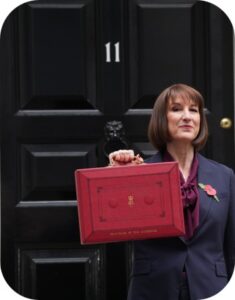
Is Britain Broke? – My Thoughts After Watching Panorama
I recently watched the BBC Panorama episode “Is Britain Broke?” and it really hit home how precarious the UK’s finances feel. The programme spotlighted the rising costs of running the country and the tough choices ahead. Inspired by what I saw—and what I’ve read since—here’s my own expanded take, complete with alternate views and voices I’ve come across.
Why Britain Feels Stretched
One of the first things that struck me is how much our demographics have changed since 1948. With life expectancy now stretching into the 80s, bringing welcome longevity, our welfare system—including the NHS, pensions, and social care—is under far more strain than it was in its early years.
Add in the soaring cost of modern healthcare—think the Cancer Drugs Fund—and we’re looking at a system increasingly pushed to its limits.
The Debt Problem: A Squeezed Budget
Panorama highlighted three major financial shocks: the 2008 crash, COVID-19, and the energy crisis post-Ukraine war. These pushed the UK’s debt toward ~100% of GDP. By 2024, it had risen to 101.8%—a level we haven’t seen since the 1960s (Financial Times, 2024).
But here’s the kicker: servicing that debt now costs the government more than it spends on defence. Estimates range from around £104 billion in debt interest—nearly double defence spending (Tortoise Media, 2025)—to as high as £126 billion, which matches the combined budgets for defence, housing, and environment (GB News, 2025).
Meanwhile, wage growth has mostly flatlined since 2008, squeezing tax revenue from everyday earners while growth benefits have accumulated elsewhere.
Politics and Broken Promises
The political reality is brutal: the UK has three basic choices—borrow more, raise taxes, or cut spending—and none are remotely popular. Talk of trimming benefits or fuel payments invariably triggers backlash and U-turns. Panorama suggests political expedience often scuppers honest debate about tough trade-offs.
But Is Britain Really Broke?
This is where things get interesting.
Economist Richard Murphy argues that Panorama missed a key point: the economy’s benefits haven’t been shared fairly. If growth happened but wages didn’t rise, someone must’ve gained—and he thinks that someone has been the wealthy and financial sectors. Wealth, he says, remains seriously undertaxed (Murphy, 2025).
Other voices back this up. According to the Equality Trust, billionaire wealth in the UK skyrocketed by over 1,000% from 1990 to 2022, while inequality costs society at least £106 billion annually compared to OECD peers (The Equality Trust, 2022).
Moreover, the Wealth Tax Commission (2020) has argued that if raising more revenue is needed, a one-off wealth tax is a better alternative to raising taxes on work or spending. A 5% levy on assets above £500,000 could raise around £260 billion.
Neil Kinnock has supported this idea too. In 2025, he proposed a 2% annual wealth tax on assets over £10 million—a measure he believes could raise £12 billion per year (The Guardian, 2025).
Other Voices Weigh In
- Fiscal watchdogs like the House of Lords Economic Affairs Committee warn that without a new, tough fiscal framework, the debt trajectory is unsustainable. They urge a reset with credible, long-term tax and spending plans (House of Lords, 2024).
- The FT points out how “tax creep” is quietly dragging middle earners into higher tax brackets because thresholds haven’t kept pace with inflation (Financial Times, 2023).
- On the right, critics caution that wealth taxes and regulation risk driving capital away. Business leaders have even warned of a potential “brain drain” if Labour pursues such policies (The Times, 2025).
My Takeaway
So, is Britain broke? No, I don’t think it’s bankrupt—but it feels broke because the quality of life we expect doesn’t match what the country can realistically afford. Politicians dodge responsibility, yet society quietly tolerates growing inequality.
I believe the solution lies in fairness: honest conversations about tax and value. That means considering wealth taxes, rethinking thresholds, and constructing a broader, more resilient revenue base. It also means prioritising spending—strategically—not just across services, but with transparency and accountability.
Until we’re ready to speak honestly about the choices ahead—borrowing, taxing, cutting, or redistributing—the sense that “Britain is broke” will keep growing.
References
- BBC (2025) Panorama: Is Britain Broke? [Television programme]. BBC One, 2 June.
- Financial Times (2024) UK debt rises above 100% of GDP for first time since 1960s. Financial Times, 22 October.
- Financial Times (2023) Tax thresholds to hit middle earners as frozen bands bite. Financial Times, 15 March.
- GB News (2025) Debt interest to overtake key spending departments under Labour plans. GB News, 10 January.
- House of Lords (2024) It’s time for tough decisions to tackle our national debt. Economic Affairs Committee, House of Lords, 5 September.
- Murphy, R. (2025) Panorama – an exercise in economic misinformation. Tax Research UK Blog, 3 June.
- The Equality Trust (2022) The cost of inequality. Available at: https://www.equalitytrust.org.uk (Accessed: 25 August 2025).
- The Guardian (2025) Neil Kinnock backs wealth tax to fund public services. The Guardian, 7 February.
- The Times (2025) Business leaders warn of exodus under Labour wealth tax. The Times, 11 January.
- Tortoise Media (2025) UK spending nearly twice as much on debt interest as defence. Tortoise Media, 10 January.
- Wealth Tax Commission (2020) A wealth tax for the UK. Final Report, London: LSE/Warwick.






